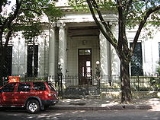
Education in Argentina
Encyclopedia
Education in Argentina is a responsibility shared by the national government, the provinces and federal district and private institutions, though basic guidelines have historically been set by the Ministry of Education. Closely associated in Argentina with President Domingo Sarmiento's assertion that "the sovereign should be educated" ("sovereign" referring to the people), education has been extended nearly universally and its maintenance remains central to political and cultural debate. Education in all levels, including universities, have always been free and not requiring to pay any kind of fee.
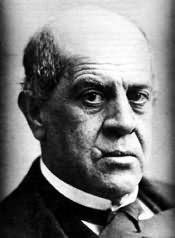 The education in Argentina
The education in Argentina
known as the Latin American docta has had a convoluted history. There was no effective education plan until President
Domingo Sarmiento (1868–1874) placed emphasis on bringing Argentina up-to-date with practices in developed countries. Sarmiento encouraged the immigration and settling of European educators and built schools and public libraries
throughout the country, in a programme that finally doubled the enrollment of students during his term; in Argentina, Teacher's Day (on September 11) commemorates his death. The first national laws mandating universal, compulsory, free and secular education (Law 1420 of Common Education
) were sanctioned in 1884 during the administration of President Julio Roca. The non-religious character of this system, which forbade parochial schools from issuing official degrees directly but only through a public university, harmed the relations between the Argentine State and the Catholic Church
, leading to resistance from the local clergy and a heated conflict with the Holy See
(through the Papal Nuncio
).
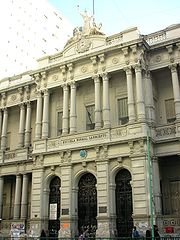 Following the university reform of 1918, Argentine education, especially at university level, became more independent of the government, as well as the influential Catholic Church. The church began to re-emerge in country's secular education system during the administration Juan Perón
Following the university reform of 1918, Argentine education, especially at university level, became more independent of the government, as well as the influential Catholic Church. The church began to re-emerge in country's secular education system during the administration Juan Perón
, when in 1947, catechism
was reintroduced in public schools, and parochial institutions began again receiving subsidies. A sudden reversal in the policy in 1954 helped lead to Perón's violent overthrow, after which his earlier, pro-clerical policies were reinstated by General Pedro Aramburu. Aramburu's Law 6403 of 1955, which advanced private education generally, and parochial, or more often, Catholic-run schools (those staffed with lay techers), in particular, helped lead to the establishment of the Argentine Catholic University.
The program of deregulation and privatization pursued by President Carlos Menem
in reaction to the country's socio-economic crisis of 1989 led to the decentralization of the Argentine secondary school system, whereby, from 1992 onwards, the schools' administration and funding became a provincial responsibility. The policy's weakness, however, lay in that federal revenue sharing
did not increase accordingly, particularly given the decision to shift two primary school years to the secondary system.
Real government spending on education increased steadily from the return of democratic rule in 1983
(with the exception of the crises in 1989 and 2002) and, in 2007, totaled over US$14 billion.
winners in the science
s: Luis Federico Leloir
, Bernardo Houssay
and César Milstein
the highest number in Latin America surpassing countries economically more developed and populated as Ireland or Spain. In addition, as of 2010, Argentines are the only Latin Americans to have ever been honoured with a Rolf Schock Prize.
The Argentine population at large benefits from a relatively high level of educational attainment, by regional standards. Among those age 20 and over, the highest level attained, per the 2001 Census, was distributed thus:
Once the EGB is completed, the student finishes the mandatory schooling period they must start secondary education. EGB is mandatory to all students.
The third stage is college education.
Education is funded by tax payers at all levels except for the majority of graduate studies. There are many private school institutions in the primary
, secondary
and university levels. Around 11.4 million people were enrolled in formal education of some kind in 2005:
In the University System however the scale can vary depending on the independent policies and statutes of grading of each independent Argentine University.

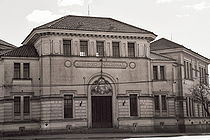 Accepted between ages 6 and 14.
Accepted between ages 6 and 14.
Primary education comprises the first two EGB cycles (grades 1–6). Because of the system that was in place until 1995 (7 years of primary school plus 5 or 6 of secondary school), primary schools used to offer grades 1–7, although most are already converted to accept 8th and 9th, others chose to eliminate 7th grade altogether, forcing the students to complete the 3rd cycle in another institution.
Conversely to what happened on primary schools, most secondary schools in Argentina contained grades 8th and 9th, plus Polimodal (old secondary) but then started converting to accept also 7th grade students, thus allowing them to keep their same classmates for the whole EGB III cycle.
This is different however, in the city of Buenos Aires (and several provinces), where Polimodal does not exist. The capital keeps in use the Traditional Argentine education system, composed of seven years of primary education (EGB I and EGB II, with the last two years composing EGB III) and five years of secondary education (the first three of which are of a more general education, with more focus on the specialization starting in the last two years). The secondary education system is thus divided in three large groups, "Bachiller" schools (very similar to grammar school
s with a huge emphasis on humanistic studies), "Comercial" schools (focusing on economic sciences and everything related to it) and "Escuelas Técnicas" (with a focus on technical and scientific assignments, this one having the particularity of lasting six years instead of five, it used to be called "Industrial") each one subdivided in more specific orientations related to its main branch. Currently there are no plans to adopt the Polimodal system in the city of Buenos Aires, but rather, several provinces with that system are seriously considering a reform of it, with many opting for the traditional system still used in Buenos Aires. Examples of provinces that use the Traditional system include (besides the capital): Córdoba
, Río Negro
, and La Pampa.
In December 2006 the Chamber of Deputies
of the Argentine Congress approved a new National Education Law restoring the old system of primary followed by secondary education, making secondary education obligatory and a right, and increasing the length of compulsory education to 13 years. The government vowed to put the law in effect gradually, starting in 2007.
Argentina's network of vocational schools, many under the auspices of the National Technological University (UTN), have historically given students viable alternatives, as well.
(opposed to the Anglo-Saxon Model). A historic event took place in the Latin American University Revolution
that finally paved the way to the modernization of the Argentinian higher university systems as it is known nowadays. Since its foundation, it was focused on the teaching of Professions offering Professional degrees.
It is divided in three levels .
Additionally, financial pressure to freshman college students force them to join the work force before graduation, thus it is very common for young students to have full-time jobs and at the same time study at the University. This is considered beneficial because when the students graduate they already have working experience, though this could also be one of the causes of the high ratio of dropouts.
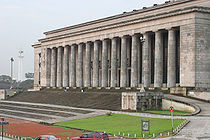 Argentina maintains a network of 39 National universities, financed by the Ministry of Education since 1946. Private and parochial universities are also abundant, numbering 46 among the active institutions and they enroll about a sixth of the collegiate student body (see University reform in Argentina and List of Argentine universities). Summing up, over 1.5 million students attend institutions of higher learning in Argentina, annually (roughly half the population of college age).
Argentina maintains a network of 39 National universities, financed by the Ministry of Education since 1946. Private and parochial universities are also abundant, numbering 46 among the active institutions and they enroll about a sixth of the collegiate student body (see University reform in Argentina and List of Argentine universities). Summing up, over 1.5 million students attend institutions of higher learning in Argentina, annually (roughly half the population of college age).
Argentina does not have a standard and common system of examination after high school, thus admission to universities is strictly defined by each university. Moreover, a steady degradation in primary and secondary education created a huge difference between the required level to enter a university and the level achieved by the high school students. Some universities like University of Buenos Aires
cope with this issue by creating a 1-year shared program called CBC that students need to complete in order to join the university. This acts like some sort of admittance course
, Doctor of Science
, Doctor of Medicine
, and Doctor of Law
, among others. Enrollment in doctorate programs in Argentina is available to candidates having earned a Licentiate
, Professorships Engineer's degree
or Master's degree
in a related area of study.
Doctoral fields of study mostly pertain to one of five fields of knowledge: Applied Sciences, Basic Sciences, Health Sciences, Human Sciences and Social Sciences
. The doctoral studies
offered by the Argentine universities include multiple fields and do have national and international validity of the degrees granted.
Academic regulations governing doctorates, and their corresponding fields, in Argentina prescribe that all graduate courses must be accredited by the National Commission for University Evaluation and Accreditation. This entity stands as a public and decentralized body working under the jurisdiction of the Department of Education, Science and Technology. It administers the process of evaluation and accreditation for all doctorate
programs, and is responsible for the institutional evaluation of all such programs at a national level. Graduate programs, including the Doctorados (PhDs), set standards per guidelines set forth by the Ministry of Science and Technology, together with the Universities Council.
Additionally, external evaluations of the doctoral programs are carried out by the National Commission for University Evaluation and Accreditation, or private entities created to that effect, together with the participation of academic peers. Argentine institutions of higher education provide further accreditation by international establishments to many of their courses of studies.
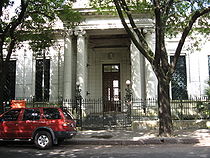
History

Argentina
Argentina , officially the Argentine Republic , is the second largest country in South America by land area, after Brazil. It is constituted as a federation of 23 provinces and an autonomous city, Buenos Aires...
known as the Latin American docta has had a convoluted history. There was no effective education plan until President
President of Argentina
The President of the Argentine Nation , usually known as the President of Argentina, is the head of state of Argentina. Under the national Constitution, the President is also the chief executive of the federal government and Commander-in-Chief of the armed forces.Through Argentine history, the...
Domingo Sarmiento (1868–1874) placed emphasis on bringing Argentina up-to-date with practices in developed countries. Sarmiento encouraged the immigration and settling of European educators and built schools and public libraries
Library
In a traditional sense, a library is a large collection of books, and can refer to the place in which the collection is housed. Today, the term can refer to any collection, including digital sources, resources, and services...
throughout the country, in a programme that finally doubled the enrollment of students during his term; in Argentina, Teacher's Day (on September 11) commemorates his death. The first national laws mandating universal, compulsory, free and secular education (Law 1420 of Common Education
Argentine Law 1420
The Law 1420 of General Common Education of Argentina was a landmark national law that dictated public compulsory, free and secular education. It was passed in 1884 during the administration of President Julio Argentino Roca, after a number of similar laws of provincial scope and the conclusions of...
) were sanctioned in 1884 during the administration of President Julio Roca. The non-religious character of this system, which forbade parochial schools from issuing official degrees directly but only through a public university, harmed the relations between the Argentine State and the Catholic Church
State-Church relations in Argentina
The first conflicts between the Roman Catholic Church and the Argentine government can be traced to the ideas of the May Revolution of 1810. The Tribunal of the Inquisition was suppressed in the territories of the United Provinces of the River Plate on 1813-03-23, and on 4 June the General Assembly...
, leading to resistance from the local clergy and a heated conflict with the Holy See
Holy See
The Holy See is the episcopal jurisdiction of the Catholic Church in Rome, in which its Bishop is commonly known as the Pope. It is the preeminent episcopal see of the Catholic Church, forming the central government of the Church. As such, diplomatically, and in other spheres the Holy See acts and...
(through the Papal Nuncio
Nuncio
Nuncio is an ecclesiastical diplomatic title, derived from the ancient Latin word, Nuntius, meaning "envoy." This article addresses this title as well as derived similar titles, all within the structure of the Roman Catholic Church...
).

Juan Perón
Juan Domingo Perón was an Argentine military officer, and politician. Perón was three times elected as President of Argentina though he only managed to serve one full term, after serving in several government positions, including the Secretary of Labor and the Vice Presidency...
, when in 1947, catechism
Catechism
A catechism , i.e. to indoctrinate) is a summary or exposition of doctrine, traditionally used in Christian religious teaching from New Testament times to the present...
was reintroduced in public schools, and parochial institutions began again receiving subsidies. A sudden reversal in the policy in 1954 helped lead to Perón's violent overthrow, after which his earlier, pro-clerical policies were reinstated by General Pedro Aramburu. Aramburu's Law 6403 of 1955, which advanced private education generally, and parochial, or more often, Catholic-run schools (those staffed with lay techers), in particular, helped lead to the establishment of the Argentine Catholic University.
The program of deregulation and privatization pursued by President Carlos Menem
Carlos Menem
Carlos Saúl Menem is an Argentine politician who was President of Argentina from 1989 to 1999. He is currently an Argentine National Senator for La Rioja Province.-Early life:...
in reaction to the country's socio-economic crisis of 1989 led to the decentralization of the Argentine secondary school system, whereby, from 1992 onwards, the schools' administration and funding became a provincial responsibility. The policy's weakness, however, lay in that federal revenue sharing
Revenue sharing
Revenue sharing has multiple, related meanings depending on context.In business, revenue sharing refers to the sharing of profits and losses among different groups. One form shares between the general partner and limited partners in a limited partnership...
did not increase accordingly, particularly given the decision to shift two primary school years to the secondary system.
Real government spending on education increased steadily from the return of democratic rule in 1983
Argentine general election, 1983
The Argentine general election of 1983 was held on 30 October and marked the return of Democracy after the 1976's dictatorship self-known as National Reorganization Process...
(with the exception of the crises in 1989 and 2002) and, in 2007, totaled over US$14 billion.
Achievements
In spite of its many problems, Argentina's higher education managed to reach worldwide levels of excellence in the 1960s. Argentina educated three Nobel PrizeNobel Prize
The Nobel Prizes are annual international awards bestowed by Scandinavian committees in recognition of cultural and scientific advances. The will of the Swedish chemist Alfred Nobel, the inventor of dynamite, established the prizes in 1895...
winners in the science
Science
Science is a systematic enterprise that builds and organizes knowledge in the form of testable explanations and predictions about the universe...
s: Luis Federico Leloir
Luis Federico Leloir
Luis Federico Leloir was an Argentine doctor and biochemist who received the 1970 Nobel Prize in Chemistry. He was the first Spanish-speaking scientist to ever receive the award...
, Bernardo Houssay
Bernardo Houssay
-External links:* * . WhoNamedIt.* . Nobel Foundation....
and César Milstein
César Milstein
César Milstein FRS was an Argentine biochemist in the field of antibody research. Milstein shared the Nobel Prize in Physiology or Medicine in 1984 with Niels K. Jerne and Georges Köhler.-Biography:...
the highest number in Latin America surpassing countries economically more developed and populated as Ireland or Spain. In addition, as of 2010, Argentines are the only Latin Americans to have ever been honoured with a Rolf Schock Prize.
The Argentine population at large benefits from a relatively high level of educational attainment, by regional standards. Among those age 20 and over, the highest level attained, per the 2001 Census, was distributed thus:
EWLINE
|
Characteristics
Education in Argentina is divided in three phases. The first comprises grades first to ninth, and is called Educación General Básica or EGB (Spanish, "Basic General Education"). EGB is divided in ´two stages, called ciclos ("cycles"):- EGB I: 1st, 2nd and 3rd school years
- EGB II: 4th, 5th and 6th school years
Once the EGB is completed, the student finishes the mandatory schooling period they must start secondary education. EGB is mandatory to all students.
The third stage is college education.
Education is funded by tax payers at all levels except for the majority of graduate studies. There are many private school institutions in the primary
Primary education
A primary school is an institution in which children receive the first stage of compulsory education known as primary or elementary education. Primary school is the preferred term in the United Kingdom and many Commonwealth Nations, and in most publications of the United Nations Educational,...
, secondary
Secondary education
Secondary education is the stage of education following primary education. Secondary education includes the final stage of compulsory education and in many countries it is entirely compulsory. The next stage of education is usually college or university...
and university levels. Around 11.4 million people were enrolled in formal education of some kind in 2005:
EWLINE
|
Qualification Modes of Grading
In the Latin American docta the scale to grade up the academic performance in students at the primary and secondary school rest in the 1-10 ladder as is described in the following frame.| Evaluative Qualifications | |
|---|---|
| Calificación/es | Tipo |
| 10 | Outstanding, Excellent |
| 9, 8 | Highly Satisfactory |
| 7, 6 | Satisfactory |
| 5, 4 | Barely Satisfactory |
| 3, 2, 1 | Unsatisfactory |
In the University System however the scale can vary depending on the independent policies and statutes of grading of each independent Argentine University.
Primary education


Primary education comprises the first two EGB cycles (grades 1–6). Because of the system that was in place until 1995 (7 years of primary school plus 5 or 6 of secondary school), primary schools used to offer grades 1–7, although most are already converted to accept 8th and 9th, others chose to eliminate 7th grade altogether, forcing the students to complete the 3rd cycle in another institution.
Secondary education
Secondary education in Argentina is called Polimodal ("polymodal", that is, having multiple modes), since it allows the student to choose his/her orientation. Polimodal is not yet obligatory but its completion is a requirement to enter colleges across the nation. Polimodal is usually 3 years of schooling, although some schools have a fourth year.Conversely to what happened on primary schools, most secondary schools in Argentina contained grades 8th and 9th, plus Polimodal (old secondary) but then started converting to accept also 7th grade students, thus allowing them to keep their same classmates for the whole EGB III cycle.
This is different however, in the city of Buenos Aires (and several provinces), where Polimodal does not exist. The capital keeps in use the Traditional Argentine education system, composed of seven years of primary education (EGB I and EGB II, with the last two years composing EGB III) and five years of secondary education (the first three of which are of a more general education, with more focus on the specialization starting in the last two years). The secondary education system is thus divided in three large groups, "Bachiller" schools (very similar to grammar school
Grammar school
A grammar school is one of several different types of school in the history of education in the United Kingdom and some other English-speaking countries, originally a school teaching classical languages but more recently an academically-oriented secondary school.The original purpose of mediaeval...
s with a huge emphasis on humanistic studies), "Comercial" schools (focusing on economic sciences and everything related to it) and "Escuelas Técnicas" (with a focus on technical and scientific assignments, this one having the particularity of lasting six years instead of five, it used to be called "Industrial") each one subdivided in more specific orientations related to its main branch. Currently there are no plans to adopt the Polimodal system in the city of Buenos Aires, but rather, several provinces with that system are seriously considering a reform of it, with many opting for the traditional system still used in Buenos Aires. Examples of provinces that use the Traditional system include (besides the capital): Córdoba
Córdoba, Argentina
Córdoba is a city located near the geographical center of Argentina, in the foothills of the Sierras Chicas on the Suquía River, about northwest of Buenos Aires. It is the capital of Córdoba Province. Córdoba is the second-largest city in Argentina after the federal capital Buenos Aires, with...
, Río Negro
Río Negro Province
Río Negro is a province of Argentina, located at the northern edge of Patagonia. Neighboring provinces are from the south clockwise Chubut, Neuquén, Mendoza, La Pampa and Buenos Aires. To the east lies the Atlantic Ocean.Its capital is Viedma...
, and La Pampa.
In December 2006 the Chamber of Deputies
Argentine Chamber of Deputies
The Chamber of Deputies is the lower house of the Argentine National Congress. This Chamber holds exclusive rights to create taxes, to draft troops, and to accuse the President, the ministers and the members of the Supreme Court before the Senate....
of the Argentine Congress approved a new National Education Law restoring the old system of primary followed by secondary education, making secondary education obligatory and a right, and increasing the length of compulsory education to 13 years. The government vowed to put the law in effect gradually, starting in 2007.
Argentina's network of vocational schools, many under the auspices of the National Technological University (UTN), have historically given students viable alternatives, as well.
Higher Education in Argentina
Argentine higher education system is based, since its conception during the colonial period, on the old and dogmatic Spanish higher education system, which is basically a Continental education systemContinental education system
The German education system or continental education system is a higher education model, often contrasted with the Anglo-Saxon education system and the Scandinavian education system...
(opposed to the Anglo-Saxon Model). A historic event took place in the Latin American University Revolution
University Revolution
The University Revolution or Argentine university reform of 1918 was a general modernization of the universities, especially tending towards democratization, brought about by student activism. The events started in Córdoba and spread to the rest of Argentina, and then through much of Latin America...
that finally paved the way to the modernization of the Argentinian higher university systems as it is known nowadays. Since its foundation, it was focused on the teaching of Professions offering Professional degrees.
It is divided in three levels .
- Tertiary Education level: 1- to 3-years degrees related to education or technical professions like TeachersTeachersTeachers may refer to:* Teachers, people who provide schooling for pupils and students* Teachers , one of the five Ascension Gift Ministries* Teachers , a British sitcom* Teachers Teachers may refer to:* Teachers, people who provide schooling for pupils and students* Teachers (ministry), one of the...
, Professorship, Technicians. - University level: 4- to 6-years Professional education taught at Universities offering four different degrees LicentiateLicentiateLicentiate is the title of a person who holds an academic degree called a licence. The term may derive from the Latin licentia docendi, meaning permission to teach. The term may also derive from the Latin licentia ad practicandum, which signified someone who held a certificate of competence to...
, Engineering degree, Medic Title, Attorney Title. - Post-graduate level: This is a specialized and research-oriented education level. It is roughly divided in a first sub-level where a Specialist degreeSpecialist degree-The Specialist degree in the Commonwealth of Independent States:The specialist degree was the only first degree in the former Soviet Union and currently is being phased out by the bakalvr's - magister's degrees....
or Master degree can be obtained and a higher sub-level where a DoctorateDoctorateA doctorate is an academic degree or professional degree that in most countries refers to a class of degrees which qualify the holder to teach in a specific field, A doctorate is an academic degree or professional degree that in most countries refers to a class of degrees which qualify the holder...
degree could be achieved.
Funding
One important aspect is that Public universities at Tertiary Education level and at University level are tuition-free and open to anyone. Although it is not required to pay any kind of fee at universities, hidden costs of education, like transportation and materials, are often neglected and a lack of a well-developed and widespread scholarship system forbids students from low-income families to enroll in public universities: for each eight students from the 20 % upper-income class, there is only one student from the 20 % lower-income class. In contrast, post-graduate education requires some form of funding and it is generally not free.Additionally, financial pressure to freshman college students force them to join the work force before graduation, thus it is very common for young students to have full-time jobs and at the same time study at the University. This is considered beneficial because when the students graduate they already have working experience, though this could also be one of the causes of the high ratio of dropouts.
College education

Argentina does not have a standard and common system of examination after high school, thus admission to universities is strictly defined by each university. Moreover, a steady degradation in primary and secondary education created a huge difference between the required level to enter a university and the level achieved by the high school students. Some universities like University of Buenos Aires
University of Buenos Aires
The University of Buenos Aires is the largest university in Argentina and the largest university by enrollment in Latin America. Founded on August 12, 1821 in the city of Buenos Aires, it consists of 13 faculties, 6 hospitals, 10 museums and is linked to 4 high schools: Colegio Nacional de Buenos...
cope with this issue by creating a 1-year shared program called CBC that students need to complete in order to join the university. This acts like some sort of admittance course
Graduate School
The doctoral fields of study in Argentina are generally research-oriented doctoral studies, leading mostly to the awarding of the degrees of Doctor of PhilosophyDoctor of Philosophy
Doctor of Philosophy, abbreviated as Ph.D., PhD, D.Phil., or DPhil , in English-speaking countries, is a postgraduate academic degree awarded by universities...
, Doctor of Science
Doctor of Science
Doctor of Science , usually abbreviated Sc.D., D.Sc., S.D. or Dr.Sc., is an academic research degree awarded in a number of countries throughout the world. In some countries Doctor of Science is the name used for the standard doctorate in the sciences, elsewhere the Sc.D...
, Doctor of Medicine
Doctor of Medicine
Doctor of Medicine is a doctoral degree for physicians. The degree is granted by medical schools...
, and Doctor of Law
Doctor of law
Doctor of Law or Doctor of Laws is a doctoral degree in law. The application of the term varies from country to country, and includes degrees such as the LL.D., Ph.D., J.D., J.S.D., and Dr. iur.-Argentina:...
, among others. Enrollment in doctorate programs in Argentina is available to candidates having earned a Licentiate
Licentiate
Licentiate is the title of a person who holds an academic degree called a licence. The term may derive from the Latin licentia docendi, meaning permission to teach. The term may also derive from the Latin licentia ad practicandum, which signified someone who held a certificate of competence to...
, Professorships Engineer's degree
Engineer's degree
An engineer's degree is an advanced academic degree in engineering that is conferred in Europe, some countries of Latin America, and a few institutions in the United States....
or Master's degree
Master's degree
A master's is an academic degree granted to individuals who have undergone study demonstrating a mastery or high-order overview of a specific field of study or area of professional practice...
in a related area of study.
Doctoral fields of study mostly pertain to one of five fields of knowledge: Applied Sciences, Basic Sciences, Health Sciences, Human Sciences and Social Sciences
Social sciences
Social science is the field of study concerned with society. "Social science" is commonly used as an umbrella term to refer to a plurality of fields outside of the natural sciences usually exclusive of the administrative or managerial sciences...
. The doctoral studies
Doctorate
A doctorate is an academic degree or professional degree that in most countries refers to a class of degrees which qualify the holder to teach in a specific field, A doctorate is an academic degree or professional degree that in most countries refers to a class of degrees which qualify the holder...
offered by the Argentine universities include multiple fields and do have national and international validity of the degrees granted.
Academic regulations governing doctorates, and their corresponding fields, in Argentina prescribe that all graduate courses must be accredited by the National Commission for University Evaluation and Accreditation. This entity stands as a public and decentralized body working under the jurisdiction of the Department of Education, Science and Technology. It administers the process of evaluation and accreditation for all doctorate
Doctorate
A doctorate is an academic degree or professional degree that in most countries refers to a class of degrees which qualify the holder to teach in a specific field, A doctorate is an academic degree or professional degree that in most countries refers to a class of degrees which qualify the holder...
programs, and is responsible for the institutional evaluation of all such programs at a national level. Graduate programs, including the Doctorados (PhDs), set standards per guidelines set forth by the Ministry of Science and Technology, together with the Universities Council.
Additionally, external evaluations of the doctoral programs are carried out by the National Commission for University Evaluation and Accreditation, or private entities created to that effect, together with the participation of academic peers. Argentine institutions of higher education provide further accreditation by international establishments to many of their courses of studies.
See also
- University reform in Argentina
- Science and technology in ArgentinaScience and technology in ArgentinaThe most important aspects of science and technology in Argentina are concerned with medicine, nuclear physics, biotechnology, nanotechnology, space and rocket technology and several fields related to the country's main economic activities....
- Argentine University Federation
- List of universities in Argentina
- Domingo Faustino SarmientoDomingo Faustino SarmientoDomingo Faustino Sarmiento was an Argentine activist, intellectual, writer, statesman and the seventh President of Argentina. His writing spanned a wide range of genres and topics, from journalism to autobiography, to political philosophy and history...
- South America Life Quality Rankings - Education Rankings
External links

- Argentine Government website for international students
- Learning in Argentina
- Ministry of Culture: Argentine Education
- Statistics and more statistics about education in Argentina
- Ministerio de Educación, Ciencia y Tecnologia
- National Commission for University Evaluation and Accreditation
- Science and Education in Argentina
- Argentine Higher Education Official Site
- The Argentine Education System
- Argentina School trip funding

